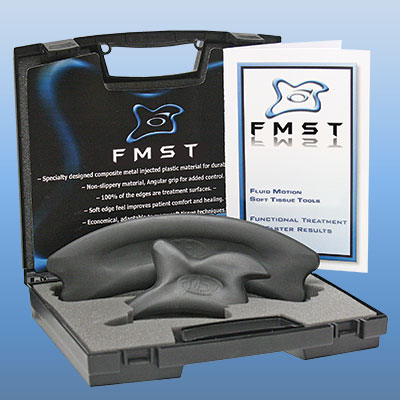FMST (Fluid Motion Soft Tissue Technique) tools are the soft tissue mobilization tools that can take myo-fascial manipulation and mobilization to the next level in your practice. The design of the (2) tools enables you to work over all surfaces of the body quickly and easily.
These tools will help you:
- Reduce scar tissue from old injuries/surgeries
- Decrease Pain
- Increase joint and muscle flexibility
Features Include:
- Angles, curves, and lengths to treat ALL areas of the body
- Unique metal injected plastic material for superior weight and durability
- Custom molded non-slip thumb grip to create maximum angular pressure without over use by the practitioner
- Soft but aggressive treatment edge to work fascial adhesions, post surgical scarring and muscle injuries
- Ambidextrous Design to prevent switching through multiple tools to find the right edge or angle
- Tools are designed to be used on both sides and on every surface
Our Unique, Metal Injected Plastic is
- Easily cleaned between patients
- Shows no wear from utilizing different lotions/creams
- Is non-marring and has shown to be very sturdy
- Has a patented indented handle that allows the practitioner to increase his grip and keep lotions and creams on the edge of the tool making the process of tissue work cleaner and more effective
Indications
- Chronic postural conditions which have associated contractile tissue strains
- Joint sprains and muscle sprains that last longer the initial 3-5 day acute phase
- Post surgical scars that restrict the joint ROM especially upper and lower extremity scars
- Painful tissue from Whiplash Associated Disorders, ex. Neck pain with decreased ROM
- Any tissue/body part that has been immobilized or casted for any significant period of time
- Loss of joint ROM after immobilization or casting
- Chronic tendonitis, nerve compression/crush syndromes, tenosynovitis, trigger fingers, and tunnel syndromes
- Any scar tissue that is raised and has multiple small keloids palpable on the tissue
Contraindications to Therapy Include:
- Acute inflammatory injury, where tissue is red, swollen, and hot
- Open wounds, cellulitis, hemorrhaged tissue
- Post surgical scars that are less than 3-4 weeks old
- Obstructive edema, patients on blood thinner medications
- Certain rheumatoid arthritis conditions
- Infections, raised moles, Lipomas
Tool Edges and Surfaces
The Fluid Motion tools (2) are a composite metal injected plastic material weighing 12 oz (larger tool) and 6.4 oz (smaller tool). The tools are designed with both concave and convex surfaces as the body has many interchanging convex and concave surfaces and the tools need to be versatile enough to accommodate any area and any patient’s body type.
The Larger Tool
Concave Surface
The concave surface is utilized most in larger areas of treatment (ex. the thoracic and ribcage region, hamstrings, quads).
Convex Surface
The convex surface is utilized efficiently where the body creates a natural concave surface (ex. Posterior knee region, plantar fascia).
Ends
The ends of the larger tool are mirror images of one another and have been specially designed to address the adhesions in the investing fascia along the thoracic, lumbar and cervical spinous processes.
The Smaller Tool
The smaller tool was designed to be the multi use tool of your toolbox. The multipurpose edges and size of the tool have been shown to be very effective in many different areas of the body. A main focus of this tool is on the extremities. The areas of the palm and fingers can be very effectively. Foot and ankle injuries are also assessed and treated with the smaller tool with less overall time spent on the patient and less tension on the doctor’s body.
Pointed End and Concave Curve
The pointed end and concave curve works around fingers, the metatarsal joints, and the opponens muscle group tendons and the foot as well.
Concave Edge
The concave edge is large enough to assess and treat the forearm, calf as well as the neck musculature.
Convex Top Surface
The convex top surface is best used in the palm, plantar fascia and the posterior shoulder musculature.
Left End or “Tail”
The left end of the tool or the “tail” has been shown to be helpful for the treatment of thumb injuries, and elbow injuries, and other smaller post surgical scars.
Billing Codes
Disclaimer: Check your individual state insurance and regulatory boards for specifics on billing a procedure such as this. Every state is different.
Most clinics bill soft tissue mobilization in the following way under the following codes
97140
Manual Therapy performed in a separate area of Manipulation
97110
Therapeutic Exercise, aimed at increasing strength, stability, ROM, endurance and flexibility
97530
Therapeutic Activities, Direct one-on-one patient contact by the provider using dynamic activities to improve functional performance






